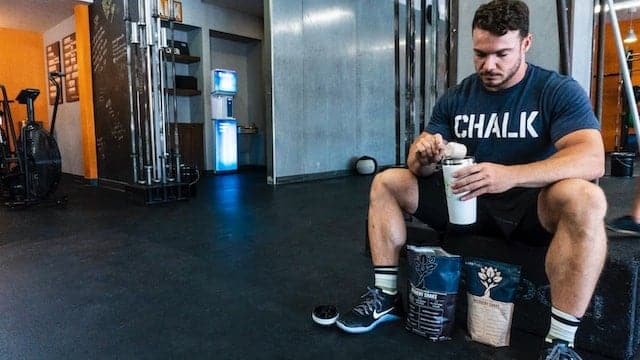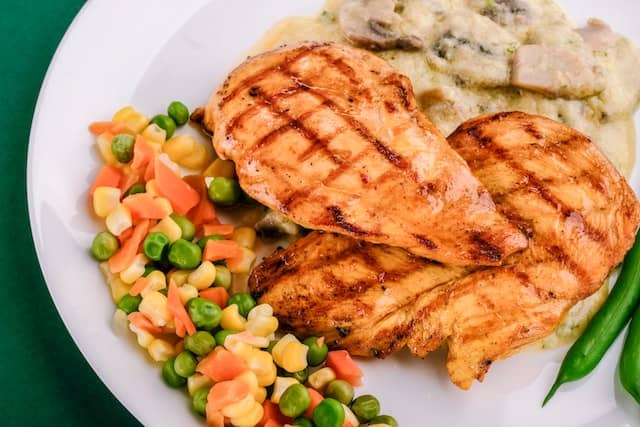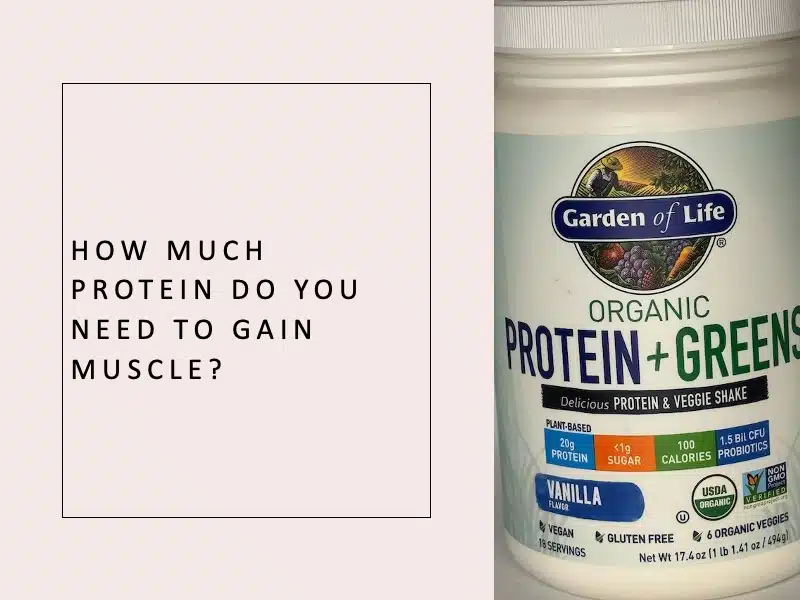How Much Protein Do You Need to Gain Muscle?
Protein is the cornerstone of muscle growth, making it essential for athletes, bodybuilders, and anyone striving to improve their physique.
Studies have consistently shown that protein intake plays a critical role in muscle protein synthesis, the process by which muscles repair and grow after exercise (Morton et al., 2018).
However, the exact amount of protein needed to optimize muscle gain can vary based on factors like activity level, body weight, and training intensity.
This article will analyze the science of protein requirements for muscle building, addressing common misconceptions, providing evidence-based recommendations, and offering practical tips to help you achieve your fitness goals effectively.
Hard work and dedication are essential factors for building muscle, but what you eat and how much you eat play just as important of a role.
Most people understand that protein is a requirement for muscle gain, but how much protein do you need to build muscle as efficiently as possible?
Furthermore, is there such a thing as eating too much protein?
Let’s take a look at the research!
The Role of Protein in Building Muscle

Protein, a macronutrient made up of amino acids, is essential for building and repairing muscle tissue. Amino acids, often referred to as the “building blocks” of protein, are divided into two categories: essential and non-essential.
While your body can produce non-essential amino acids on its own, essential amino acids must come from dietary sources or supplements to support optimal muscle growth and recovery.
Adequate protein intake is vital for the muscle repair process that occurs after intense workouts.
When you exercise, your muscle fibers sustain microscopic tears that need to be repaired for muscles to grow stronger and larger.
Protein facilitates this repair process by supplying the necessary amino acids for rebuilding muscle tissue.
Muscle mass also serves as the body’s primary protein reserve. Without sufficient dietary protein, the body may break down existing muscle tissue to meet its repair and recovery needs.
While true protein deficiency is rare, many people fall short of consuming enough protein to maximize muscle-building potential.
Prioritizing high-quality protein sources and timing your intake effectively can make a significant difference in achieving your fitness goals.
How Much Protein Do You Need for Muscle Gain?
Protein needs largely depend on your lifestyle and the type of exercise you are doing.
- The required protein for people varies based on their lifestyle.
- People who exercise frequently require a higher recommended daily protein intake than those who do not.
- However, higher protein diets such as the ketogenic diet can benefit some people even if they are not regularly exercising.
According to the U.S. Department of Agriculture (USDA), most adults over the age of 19 should consume about 10% to 35% of their daily calories as protein.
One gram of protein contains approximately 4 calories, so if you typically consume 3,000 calories daily, you should consume between 75 and 262.5 grams of protein daily.
The Recommended Dietary Allowance (RDA) for protein is 0.8g for every 1kg of body weight, which is the recommended amount to maintain the nitrogen balance in your body and prevent muscle loss.
However, to build muscle mass, your muscle protein consumption needs to exceed your muscle protein breakdown.
According to most research, the optimal protein intake for peak muscle growth is not specifically known, but a daily intake of 1.6 to 2.2 grams of protein per kilogram of body weight appears to show the most promising results.
Best Sources of Protein for Muscle Gain

You can meet your daily protein requirements by eating plant and animal-based proteins, which could be in the form of whole foods or supplements.
Best High-Protein Foods for Building Muscle
A high-protein diet is essential for muscle growth, as protein provides the building blocks (amino acids) necessary for muscle repair and development.
When I choose protein sources, I consider the food’s overall nutrient density to determine whether it is one of the best foods for building muscle.
The best sources of protein for muscle building can be divided into animal-based and plant-based categories, each offering unique advantages.
For plant-based diets, aim to combine different sources (e.g., beans and grains) to ensure a complete amino acid intake.
Additionally, because plant protein sources are often less bioavailable, consider consuming slightly more protein overall to meet your muscle-building goals.
Best Animal-Protein Sources
- Grass-Fed Beef
Grass-fed beef is an excellent choice for building muscle because it is rich in high-quality protein and contains a higher concentration of healthy omega-3 fatty acids compared to grain-fed beef. It also provides essential micronutrients like iron, zinc, and vitamin B12. - Eggs
Eggs are one of the most bioavailable sources of protein, meaning your body can absorb and use them efficiently. They are also rich in leucine, a key amino acid for muscle protein synthesis. - Bison
Bison is a lean alternative to beef, offering high-quality protein with fewer calories and less saturated fat. It is rich in iron and has a mild flavor, making it versatile for many recipes. - Wild-Caught Fish and Seafood
Salmon, mackerel, and sardines are particularly valuable because they combine high-quality protein with omega-3 fatty acids, which reduce inflammation and support recovery. Shellfish like shrimp and scallops are also excellent low-fat, high-protein options. - Chicken and Turkey
These lean meats are staples for muscle building due to their high protein content and low-fat levels. Opt for skinless cuts to minimize saturated fat intake.
Plant-Protein Sources
- Beans and Lentils: Black beans, chickpeas, and lentils provide significant amounts of protein along with fiber, which supports digestive health. Combining them with grains like rice creates a complete protein profile.
- Peas and Pea Protein: Peas are a great source of plant protein, often found in supplements. They are hypoallergenic and provide a balanced amino acid profile, making them ideal for those with dietary restrictions.
- Nuts and Seeds: Almonds, chia seeds, and hemp seeds are nutrient-dense options that provide protein along with healthy fats. Hemp seeds, in particular, are a complete protein source, containing all nine essential amino acids.
- Soy-Based Foods: Tofu, tempeh, and edamame are high-protein soy products with a complete amino acid profile. They are versatile and can easily be incorporated into various dishes.
- Hemp: Hemp protein is a complete plant-based protein containing all essential amino acids, along with healthy fats and fiber.
Best Protein Supplements for Building Muscle
Protein supplements are effective for muscle growth, offering a convenient, concentrated source of protein to support recovery and repair.
Whey Protein
- Whey Isolate: High protein content (90%+), low fat and lactose, and fast absorption make it ideal post-workout. The best isolates are better than whey concentrates.
- Whey Concentrate: More nutrients from milk but slightly less protein (70–80%). Affordable yet less suitable for lactose-sensitive individuals.
- Hydrolyzed Whey: Pre-digested for rapid absorption, ideal for athletes needing quick recovery, though more expensive.
Casein Protein
Slow-digesting protein releasing amino acids over time, perfect for overnight muscle repair.
Plant-Based Protein Powders
- Pea Protein: Hypoallergenic, rich in essential amino acids, great for vegetarians and vegans.
- Rice Protein: Easily digestible; combine with pea protein for a complete amino acid profile.
- Hemp Protein: Includes healthy fats and fiber, offering complete protein but lower content per serving.
- Soy Protein: Comparable to whey in quality, supporting muscle growth with a complete amino acid profile.
My favorite protein supplement is Garden of Life Organic Protein and Greens:
Last update on 2025-07-03 / This article includes affiliate links/Images via Amazon Product Advertising API. I may earn commissions on purchases made through these links.
Collagen Protein
Bovine collagen supplements like Vital Proteins Collagen Peptides or Purely Inspired Collagen Peptides support connective tissue health, aiding injury prevention and recovery.
However, research does not indicate that collagen supplements are as effective as vegan protein and whey protein supplements for building muscle.
Last update on 2025-07-03 / This article includes affiliate links/Images via Amazon Product Advertising API. I may earn commissions on purchases made through these links.
Amino Acid Supplements
Amino acid supplements provide a convenient and effective form of protein that can be consumed intra-workout and several other times of day.
- Essential Amino Acids (EAAs): EAA supplements like RSP Amino Lean provide all nine essential amino acids, directly stimulating muscle protein synthesis, especially in low-protein diets.
- Branched-Chain Amino Acids (BCAAs): BCAA supplements like Xtend BCAA contain only the three branched-chain amino acids, leucine, isoleucine, and valine, which reduce muscle breakdown and support endurance during workouts.
Can You Consume Too Much Protein?
Although you need to consume a lot of protein to build muscle, you do not want to overconsume protein.
Most doctors suggest that a healthy adult can have a protein intake of up to 2 grams per 1 kg of body weight without side effects, and people who work out frequently, such as athletes, may consume up to 3.5g per kg without any problems.
- Eating more than 2.2-2.5g of protein per kg of body weight daily could lead to health issues, such as weight gain, nausea, fatigue, heart disease, and kidney or liver issues.
- While protein is vital for building muscles, it is not the only nutrient you need.
You also need to get enough carbohydrates and calories.
Ignoring these nutrients would do more harm than good and may cause serious health complications in the future.
In addition, ensure to drink lots of water. Besides helping to prevent dehydration, water can help your body remove excess protein.
Final Thoughts – Protein Needs for Maximum Muscle Gain
The best way to support muscle building is to combine strength training with a protein intake between 1.6 and 2.2 grams of protein per kilogram of bodyweight
To meet these needs, you can consume proteins such as lean meat, nuts, legumes, eggs, and dairy products to meet your daily needs.
However, if you struggle to meet the required amount, consider buying protein supplements like Garden of Life Raw Protein & Greens.
Last update on 2025-07-03 / This article includes affiliate links/Images via Amazon Product Advertising API. I may earn commissions on purchases made through these links.
Keep in mind that the optimal amount of protein consumption to build muscle mass varies from person to person based on several factors.
Furthermore, you should not consume too much protein.
As always, it is best to speak to a doctor or registered dietitian to discuss what amount of protein is optimal for you.
This website does not provide medical advice. This website site does contain affiliate links, and purchases may earn a commission.
Read my Medical Disclaimer, Review Disclaimer, and Publishing Policies for more details. Use of this site indicates acceptance of these terms.






